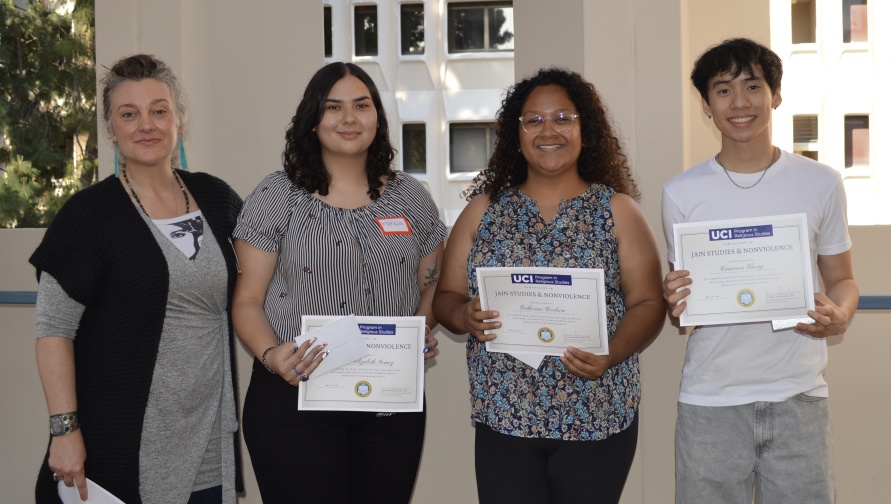
FIRST COHORT AWARDED CERTIFICATE IN JAIN STUDIES AND NONVIOLENCE
The UCI Program in Religious Studies began this certificate in 2023; this is the first cohort of students who have completed the certificate.
The Certificate in Jain Studies & Nonviolence is available for undergraduate and graduate students in any school across campus. The certificate emphasizes the historic development of the internally-diverse Jain community and tradition alongside other perspectives in the Indian subcontinent, as well as key Jain concepts and practices including plural ontology, Jain "Universal History," karma theory, many-sided knowledge, philosophy of nonviolence and practical restraints, views of plants and animals, Jains in India and diaspora, ritual and devotion, and a critical assessment of how Jain thought might apply to contemporary ethical issues.
Given that the Jain concept of nonviolence, though rooted in antiquity, contributed to the practical nonviolence of Gandhi and Martin Luther King, Jr., this certificate invites students to consider new applications of nonviolence in the context of cultural and political diversity and multispecies flourishing. The certificate requires students to take two courses:
REL STD 120 Jain History, Philosophy, and Ethics
REL STD 126 Topics in Jain Studies (topics vary) and to put these two courses into conversation with a third relevant course through a final analysis. All three students have chosen to put their Jain Studies courses into dialogue with a third class on Animal Ethics and Religions.
Cameron Cheng ’25
Cameron analyzes Peter Singer’s normative ethical theory of utilitarianism as a way to estimate and aggregate the satisfaction of preferences across all affected beings alongside an aspect of Jain logic called syādvāda. Syād-vāda, which translates from the Sanskrit literally as “perhaps doctrine” is a sevenfold modality of predication that holds that any philosophical assertion (including moral judgments) may be “perhaps so,” from a particular perspective; “perhaps not,” from another perspective, “perhaps both,” or “indescribable” in different respects, thereby preserving the kind of epistemic humility and multifaceted perspectives that Singer’s perspective does not entail. In the same vein, while Jain ethics appeal to concrete vows (like ahiṃsā) to guide conduct, it does not collapse its analysis into a single decision algorithm as one finds with some universal ethical principles such as utilitarianism. This contrast exposes a methodological gap—and an opportunity—to craft a hybrid framework that marries Singer’s drive for clear, actionable choice with Jainism’s perspectival pluralism, structuring a decision process that remains both practical and open to uncertainty.
Catherine Cordova ‘25
Cathy is investigating sentience and the capacity for suffering described within Jain's karmic matter and Tom Regan’s deontological perspective on animal rights. In the Jain view, karma is theorized as a subtle matter that adheres to the core life force of every existent entity, implying that no entities are simply passive objects. Cathy makes a comparison with Regan’s claim that any being who is a “subject-of-a-life” can experience pain, fear, and distress that is relevant and impactful, and likewise, these subjects of life are not merely passive objects.
Cathy asserts that these two perspectives of karmic matter(ing) and Regan’s deontological expansion of subjectivity allow for the consideration of nonhuman suffering and thwarted capacities as morally significant.
Marissa Gomez '25
Marissa was interested in the metaphysical ingredients of changing mental modes related to preconceived feelings, habits, and mental frameworks regarding non-human beings. She examined the Jain concept of ahīmsā, or nonviolence, as a philosophical counter to Aristotelian hierarchy. Whereas Aristotle’s political order instantiated a moral exclusion through the binary distinction between rational and non-rational beings, Jain's technical concepts and praxes of nonviolence recognize how all birth forms in the Jain cosmography have intrinsic value that is not based only on a rational quality. Further, she put the difference-based ethical approach of French philosopher Jacques Derrida into dialogue with the Jain concept of anekāntavāda. This term, which in Sanskrit means "many-sided view," offered Marissa a parallel path to Derrida’s claim that the plurality of every entity “cannot be assembled within the single figure of animality that is simply opposed to humanity" (Derrida 124). No entity is simply “human” or “animal,” but each is a unique "unsubstitutable singularity," different from every other in the same category and even changing within itself from moment to moment. Marissa crafted new ingredients for mental models that emphasize intrinsic value and radical uniqueness, capable of constructing new feelings with non-human beings.
More than this, Marissa used this work to apply to the International School for Jain Studies, for which she was awarded for the summer of 2025! She will now spend five funded weeks in India this summer with other advanced and graduate students conducting research and observing the lived Jain tradition.
Awards
As part of their certificate, we gifted each student a handmade pin of the open-palm mudra, which in the Jain tradition means "peace," or "stop" before acting in a world packed full of inviolable life.
In addition, the Jain Chair endowment provided Marissa Gomez with an additional $250 gift card to help offset study abroad expenses.
Photo caption (L to R):
Professor Brianne Donaldson, Marissa Gomez, Catherine Cordova, Cameron Cheng
